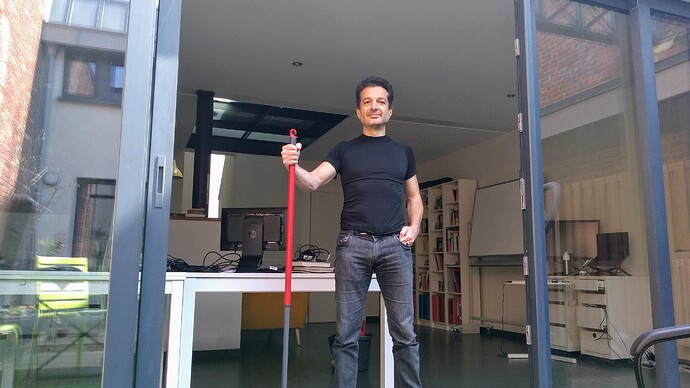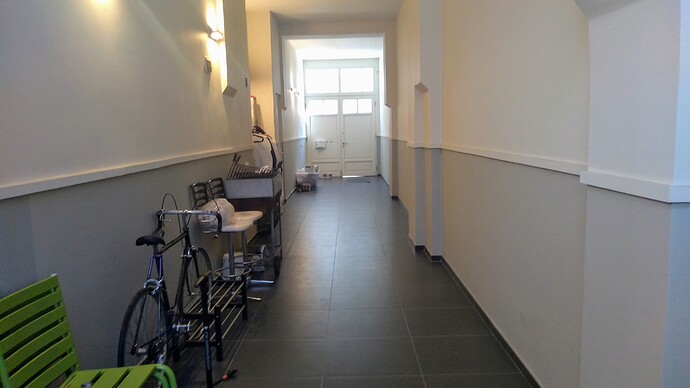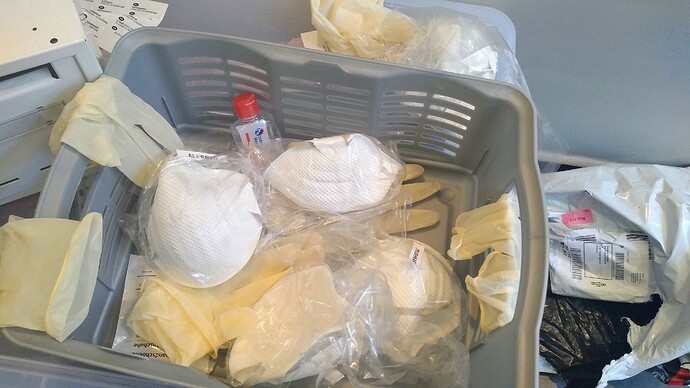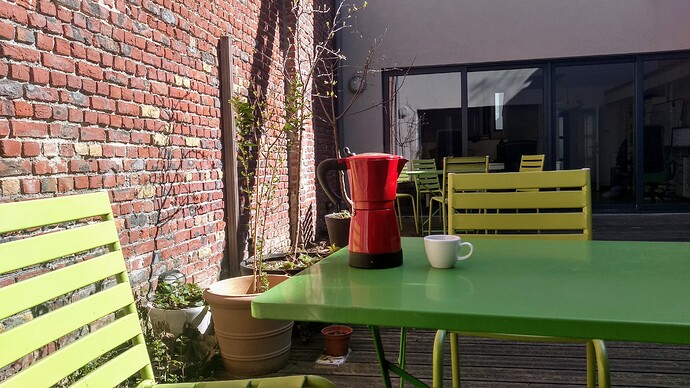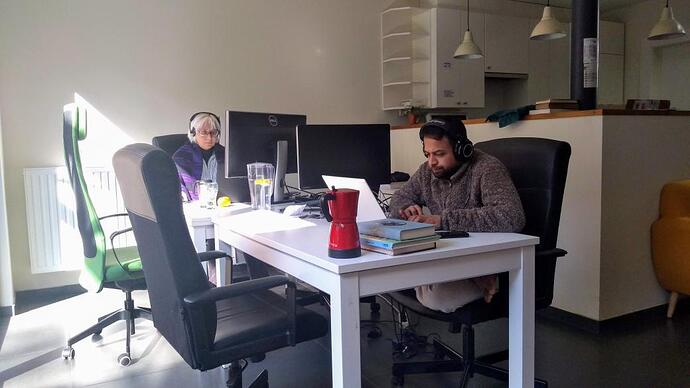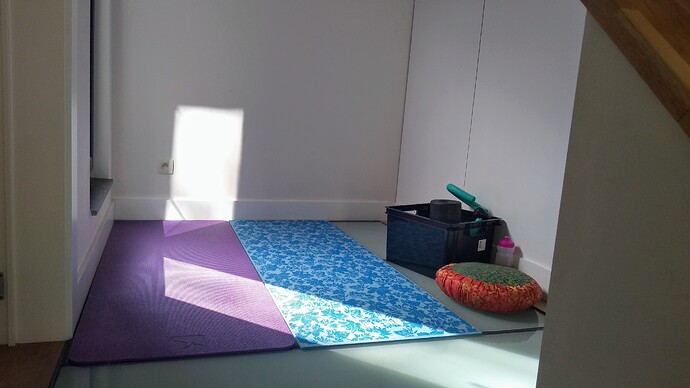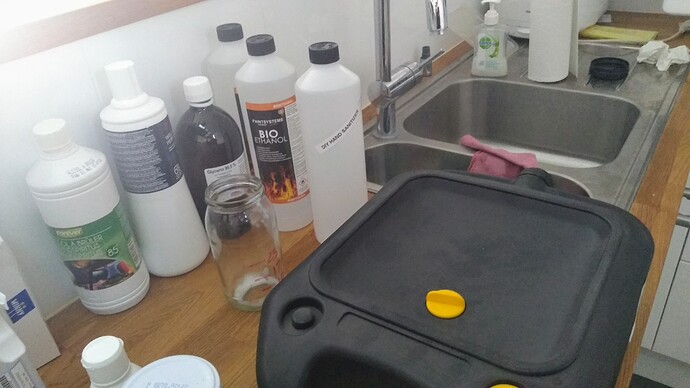With cleaning services locked down, there are enough people living at The Reef to keep it clean and reasonably tidy
I live in Brussels, a city currently in lockdown as it struggles with the SARS-CoV-2 pandemic. Like everyone else, I engage in social distancing, and stay at home a lot.
But not exactly like everyone else. My life is a little different, because my home is different. I live in The Reef, the prototype of a new kind of lived space. Its inhabitants are humans and small businesses. They share a roof to live in harmony with each other, their neighborhood, and the planet. What we have now is only a prototype, four bedrooms instead of the 15-30 we envision. But still, the pandemic is putting it through an unexpected test. What can we learn from it? How does one live in a co-housing space during a pandemic?
Pretty well, it turns out.
The compound structure creates a natural “oasis”
The Reef prototype consists of two self-standing lofts, facing each other across a courtyard, plus various bits and pieces. The compound squats in what used to be a factory complex. Access to the street is through a long and narrow private hallway. During the lockdown phase, the hallway is a natural “hot zone”. Deliveries arrive here, where we can disinfect them or simply leave them for a few days, until out-of-host viral DNA breaks down. We also keep masks, rubber gloves and hand sanitizer here for when we go out.
Once inside the Reef proper, the dweller gets a nice sense of peace and protection. The city seems far away (unless the school next door is giving children a mid-morning break, which of course does not happen in lockdown). The courtyard is a great resource when the weather is sunny. It gets direct sunlight for most of the year, and its high surrounding walls create a sense of quiet and concentration, a little like an oasis.
Instant neighborhood office
We reconverted to office one of the living room + kitchen open spaces. Edgeryders rents it as its Brussels office. So, in a normal weekday 2-5 of my colleagues work from here, though I am the only one that also lives in the compound. During lockdown, my colleagues work from home, so I have offered the office to my housemates. No working from the couch for us! We get a proper professional space, clean and minimalistic, with fast Internet, a decent printer, a whiteboard, projectors, external screens and so on.
This is especially nice, because it realizes our vision of the “neighborhood co-working space”. Many people appreciate going to the office, where they can socialize with colleagues and work from a space that is physically and mentally separated from the home and the family. But there is no reason to dive into traffic: you can get the same things in a remote work-ready facility five minutes walking from your door. No more commuting!
As I write this, four people use the office of the Reef every day. One works in the IT department of a bookshops chain. Another is a developer for a mobile phone company. Yet another works in a logistics company. And finally, I work for Edgeryders. We work side by side, chat over lunch breaks, and generally do everything you do in any office. It works great, there are no problems that I can see.
Redundancy brings resilience
Each of our two lofts is a fully independent unit. We have eliminated some duplication: for example, as I wrote above, one of the two living-kitchen spaces has become the office. But the redundancy is still there, and can be deployed as needed. Last week, for example, we had a brief scare when we found some water on the kitchen floor. We determined it was coming from the dishwasher. During lockdown, it could be problematic to get a plumber to come over and fix it. But guess what: in the office we have a second dishwasher – in fact we have two full kitchens, two full bathrooms and two toilets. It takes a lot of trouble to take us down. Redundant systems for the win!
We even have a sketch of a plan for if one of us gets infected. The infected person’s room immediately becomes a “hot room”. We will vacate the floor, and leave it at the disposal of the infected person (only two rooms per floor, so only one room to vacate). This way, the infected person will have a bit of breathing space, and his or her own bathroom. One of us will have to sleep in the living room or the office (we have couches and an inflatable mattrass), which sucks but beats the alternatives.
Extra spaces for unusual activities
More people living in the same roof means getting some economies of scale. For example, we only have one washing machine in the whole compound. This means that we are more efficient than nuclear families in using space. We use the extra square meters for unusual, nice-to-have activities, especially in lockdown. For example, we now use one of the landings as a mini-workout space.
The sink of the second kitchen is now the basis for producing DIY hand sanitizer.
And this is nothing. A former housemate had reclaimed our largest closet to use as a sort of biohacking lab, where he grew all sorts of mushrooms and yeasts. I expect even more creativity as we go.
Social distancing, but not isolation
Even in lockdown, the microcosm of The Reef offers some sociality. We have small or long chat over the dining table. We play board games. Last Friday we ordered in some Thai food. It beats living alone in a studio apartment.
And, even with only four people, we have a bit of social structure. We are four individuals; two of us are a couple, and they spend more time with each other than with the rest of us. And then there is the collective, everyone together, for activities like planning the groceries or the cleaning. With 15-30 people, I expect to observe a richer structure, much like that you would find in a band of hunters-gatherers.
In sum, pretty good!
The prototype Reef is just this: a prototype. If this were the full Reef, we would be twenty instead of four. We would have more skills, manpower, facilities. We would probably be making masks for the whole neighborhood. Hell, we would be making electricity. We would be handing out spare laptops to families in need of extra devices for the kids’ remote learning. And so on.
But, as long as the full Reef lies still in the future, I can’t think of a better place to be locked in than this. This is remarkable, because we certainly did not design it with a pandemic in mind! In my book, this shows that the Reef’s concept is robust to unknown unknowns. I look forward to seeing it bloom to its full potential in the coming years.
